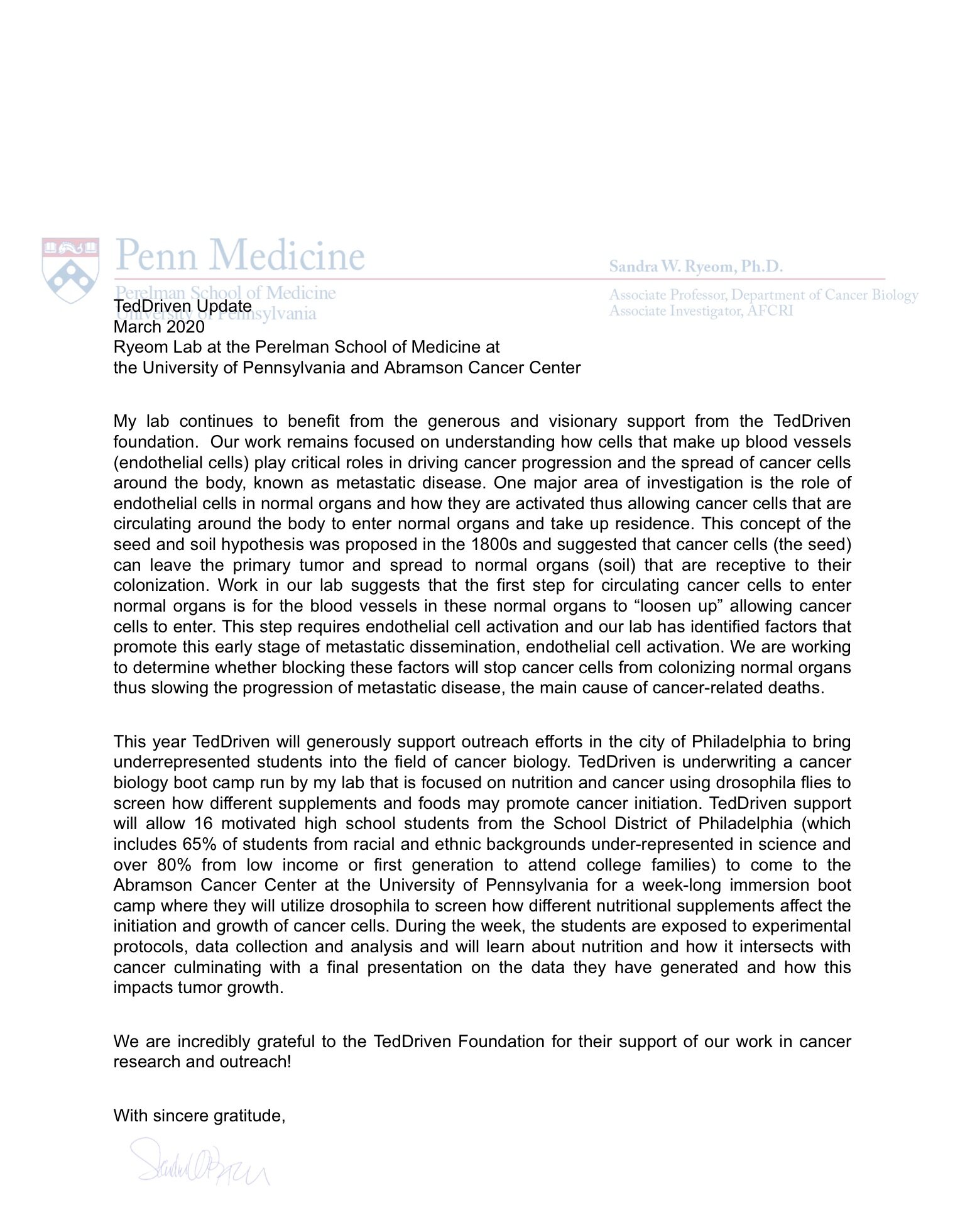Beginning in 2022, we followed Dr. Sandra Ryeom to her new research home at Columbia University Irving Medical Center where we continue to invest in her cutting edge research in the quest to understand and eliminate cancer. You can learn more at https://www.cuimc.columbia.edu
Abramson Family Cancer Research Institute
The Abramson Family Cancer Research Institute leads important efforts in the study of cancer cell metabolism, the tumor microenvironment, DNA damage responses, cancer genetics/genomics, immune responses, immunotherapy, and other scientific areas to better understand cancer and develop improved treatment for those afflicted with this disease. LEARN MORE
VP Biden visits Abramson Cancer Lab
January 22, 2016: Vice President Biden Kicks off “Moonshot” Effort at Abramson Cancer Center
Letter from Dr. Sandra Ryeom
January 20, 2015
Penn Study
August 15, 2013: Tumors Form Advance Teams to Ready Lungs for Spread of Cancer
Letter from Evelyn Schwartz
January, 7 2013
Letter from Dr. Sandra Ryeom
September 26, 2012
Dear Ian, Lynda and Wendy and supporters of TedDriven,
With the ongoing support from TedDriven, we continue to make exciting progress on projects in the lab focused on understanding the biology driving cancer progression. Here at the University of Pennsylvania School of Medicine in the Department of Cancer Biology and at the Abramson Cancer Center, my lab is focused on the basic science aspect of the biology of cancer and identifying new targets for treatment at the cellular and molecular level. However, the integrated multidisciplinary effort here at U. Penn and the Abramson Cancer Center allows us to work closely with clinicians and physician/scientists working towards translating what we do in the lab to new therapies for patient care.
We have made significant advances in the lab this past year. One area has been towards understanding how cancers metastasize or travel throughout the body. As cancers continue to grow, they often leave their primary site, or the site that they first began to grow in and travel to other parts of the body. Most often, it is due to the tumors that travel to other parts of the body, or metastatic disease, that is fatal for cancer patients. We have been trying to understand specifically how tumor cells metastasize (or travel) to the lung, a very common site for tumors to metastasize. To that end, our studies have focused on investigating the role of the blood vessels in the lung ‘priming’ the lung to allow tumor cells to take up residence there and form tumors. Our data suggests that activation of the blood vessels due to the activation of specific protein in blood vessel cells in the lung is a key step permitting circulating tumor cells to lodge in the lung. Our goal is to understand how the blood vessels become activated and to determine whether we can block this activation with drugs to prevent tumor cells from spreading. For these studies, we utilize mouse models of cancer and pictures taken from the lungs of these mice. We have found that we can identify the future metastatic site by expression of this specific protein (represented by the blue staining in the images below) that becomes activated in blood vessels at this site, well before tumor cells arrive at this site.
We are now working to determine whether we can validate our findings in patient samples as well as figure out a way to stop tumor cells from settling at these locations thus preventing the spread of cancer. We hope to one day have the ability to both predict when cancers are going to metastasize before that actually happens and to treat these patients with drugs that will block the ability of tumor cells to settle into different organs. This work would not have been possible without support from TedDriven.
With the climate of decreased funding from the NIH and budget cuts by the federal governemtn, support from foundations such as TedDriven are crucial for academic scientists. The lab and I are truly grateful for the continuous support from you and all the runners and supporters of TedDriven that has allowed us to explore novel hypotheses that have led to the identification of new potentially “drug-able” targets to halt cancer progression. We look forward to keeping all of you updated with our progress in the lab and wish everyone luck in the upcoming marathons, half-marathons and relays!
With gratitude,
Sandra






